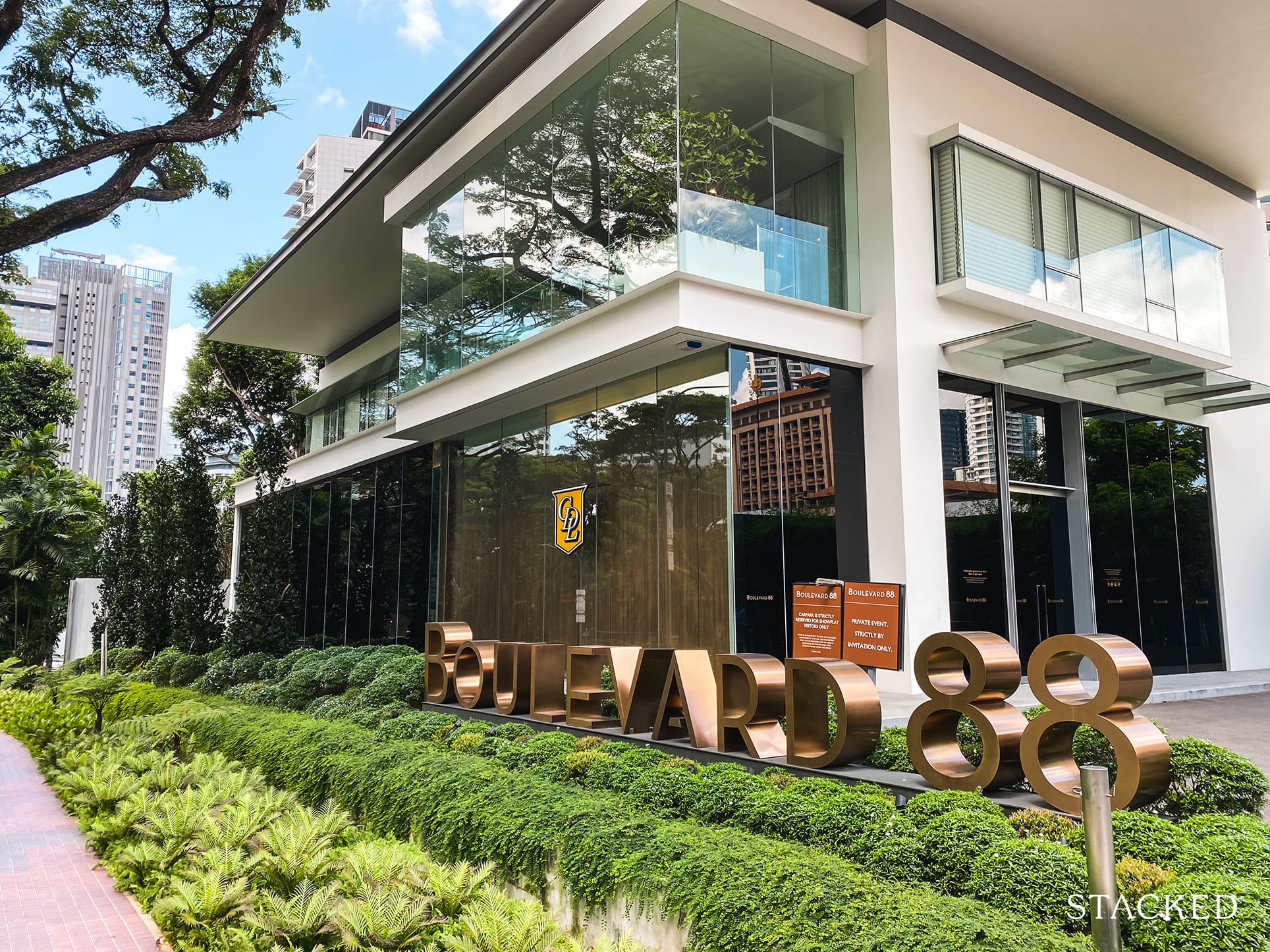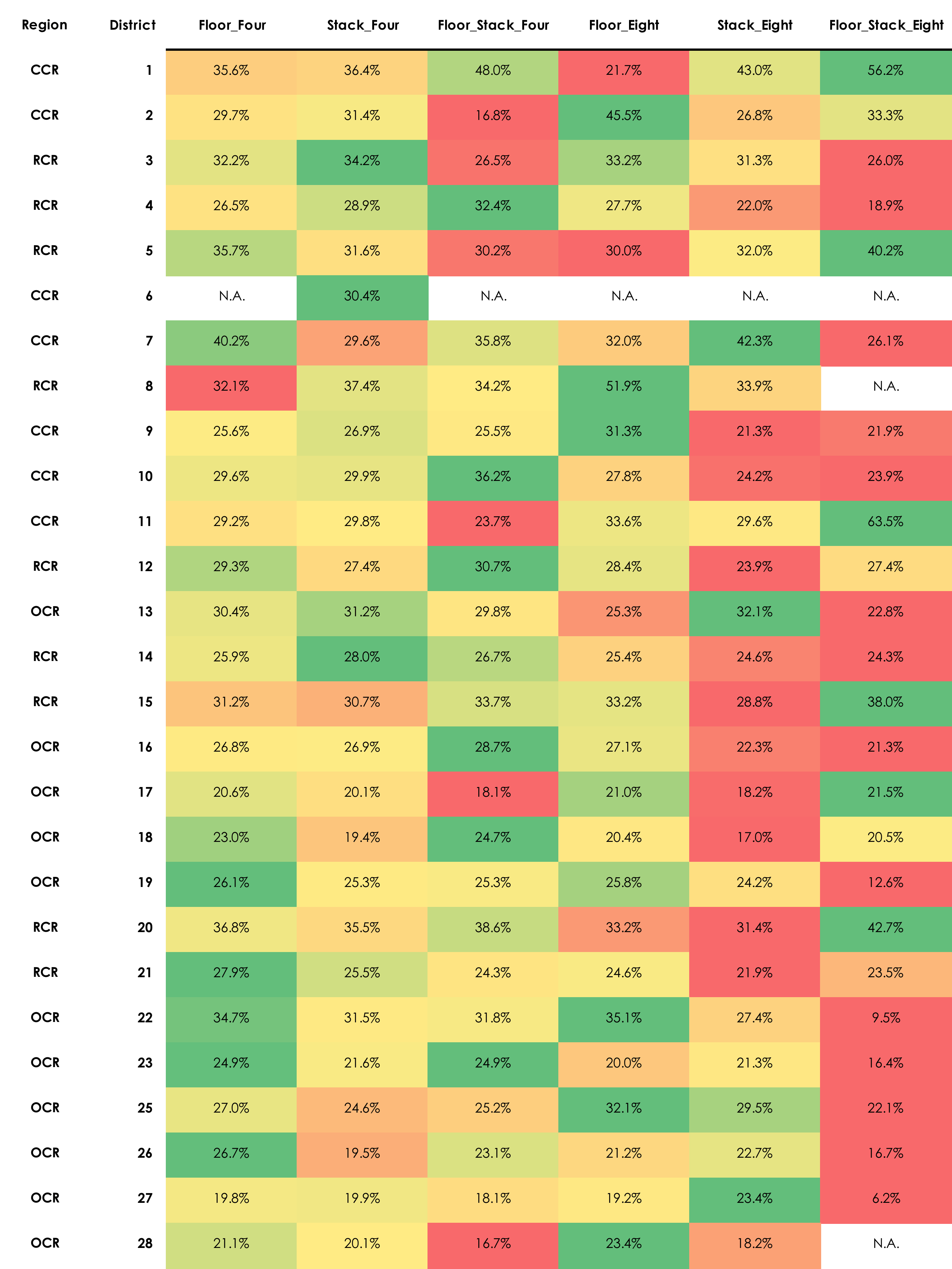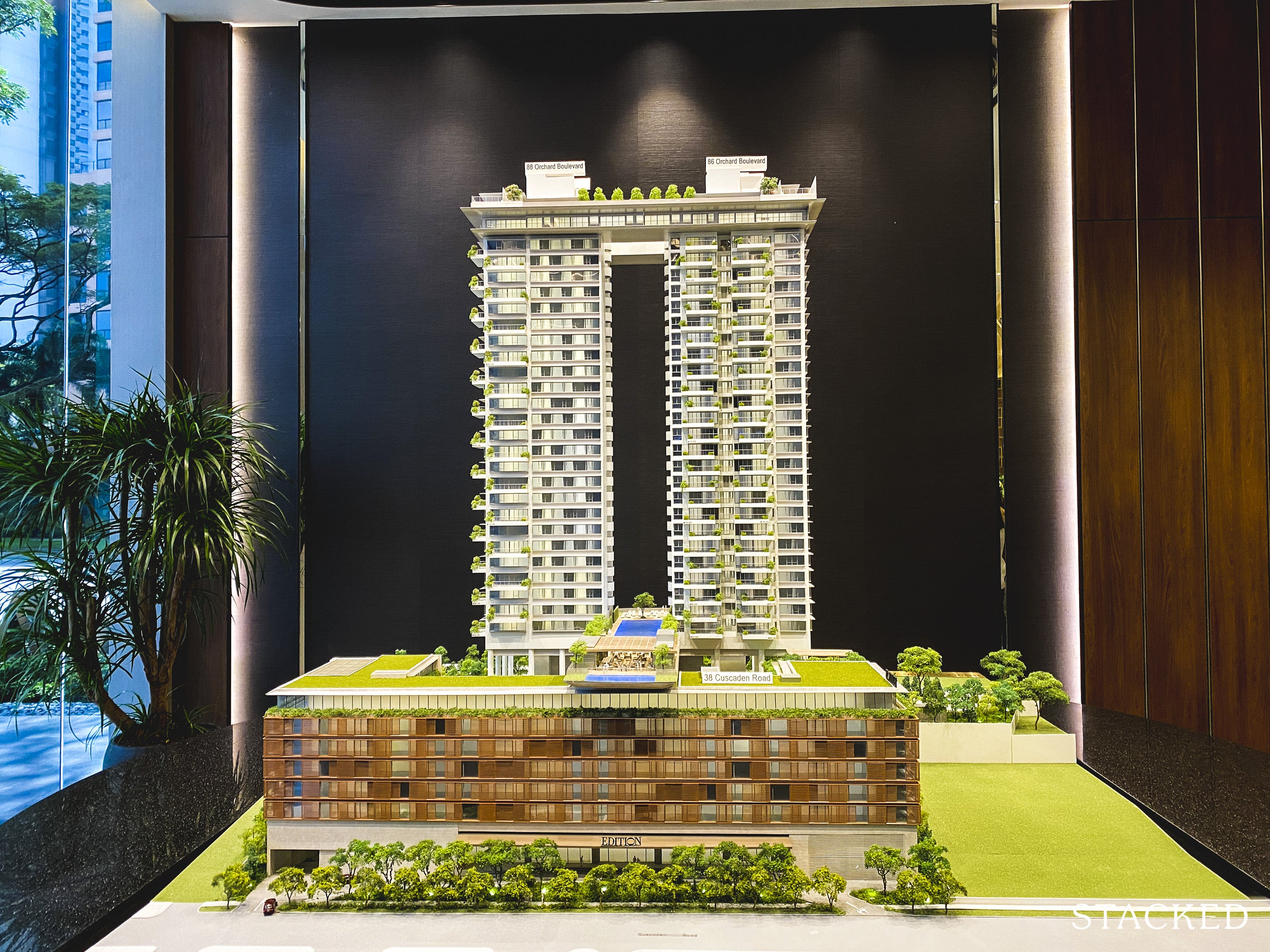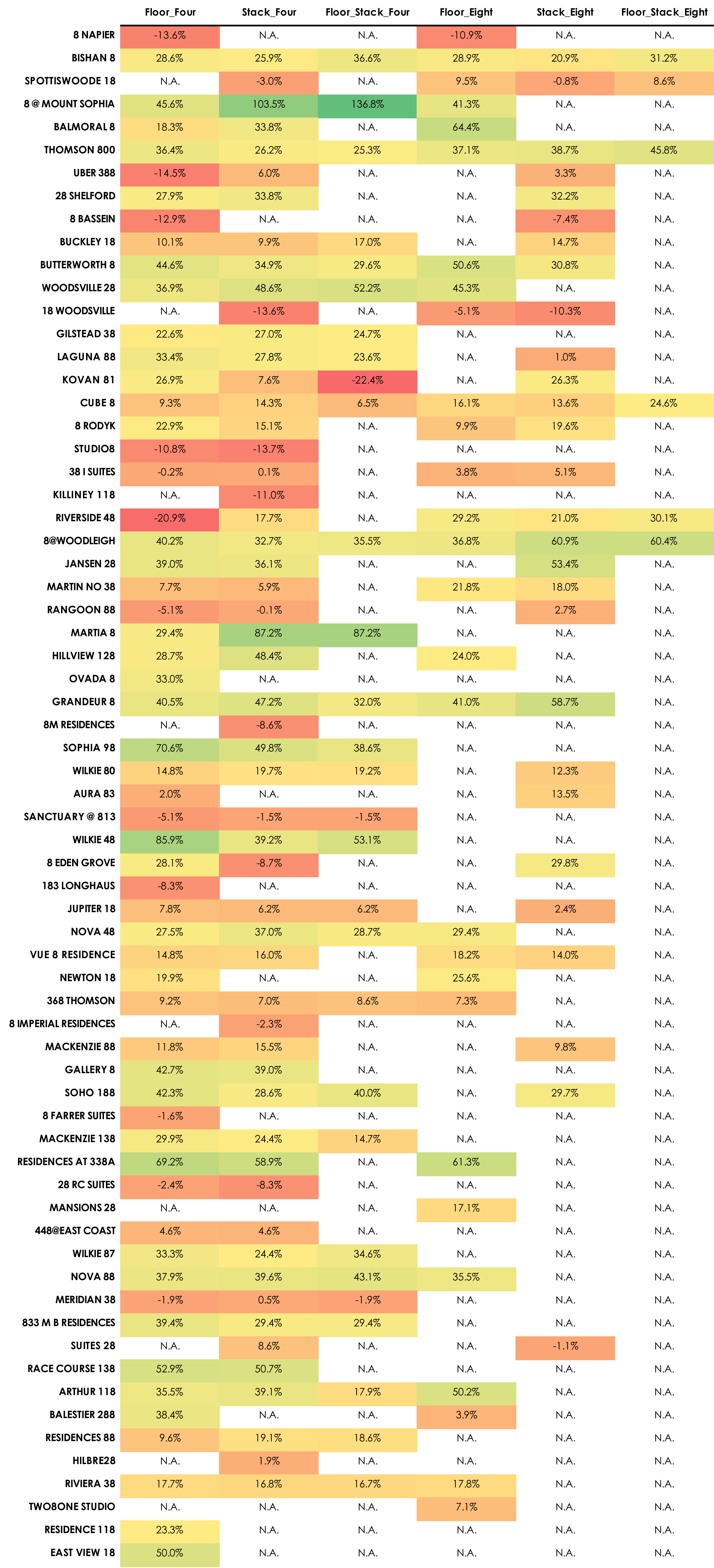Do Property Superstitions Really Affect Profits? We Look At 26 Years Of Data
February 15, 2022

As a Chinese, my behaviour and thoughts are influenced by superstitions and beliefs that my parents and relatives planted in me, while I was growing up. Yet, I was not alone, as I observed the same traits in my social circle, which belies the evolution of science and technology that shaped our modern society.
This inseparable attachment to superstitious beliefs, particularly, numerological superstitious, is thus commonly extended to almost everything under the sun. From car plate numbers to your mobile number, and unsurprisingly, for property purchases as well. As an example, buying addresses or unit numbers with one or more “8”, which is pronounced like the Chinese word “prosperity”, or avoiding those with “4”, which sounds similar to the Chinese word “death”. The similarity in the pronunciation of a number to another word is believed by the Chinese to have a causal impact on our home purchases that these numbers are associated with.
For many of us, buying a home may be our largest financial commitment. Like other investments, property purchases can be encumbered with uncertainties (e.g. the development of our neighbourhood, changing housing policies and not forgetting God’s Act). Thus, buying a home with “auspicious” numbers (e.g. “8”) may be a confidence jab to assure homebuyers that they are likely to enjoy pleasant future events (e.g. huge capital gains) while averting unpleasant ones (note: just ask the buyer of unit #08-08 at Pasir Ris 8 or QingJian Perennial on why they chose to skip stack number 44 from their latest freehold development – “Forett @ Bukit Timah”.).
And so, would buying a home with “auspicious” addresses/unit numbers usher good fortune or would buying one with “inauspicious” numbers spell doom for buyers when it comes to their real estate profitability? We studied the data of private home transactions from the past 26 years with either set of numbers and their impact on prices, which are presented below. Read on to find out more!
Table Of Contents
- Notes on this study
- Key findings
- 1. “Auspicious” tend to underperform “inauspicious” homes
- 2. “Auspicious” homes in the CCR outperformed other regions
- 3. “Auspicious” homes tend to do worse among most districts
- 4. “Auspicious” homes tend to be more unprofitable regardless of unit size
- 5. No strong evidence that developments with “auspicious” numbers do better
- 6. “Auspicious” homes fared the worst in most transaction types
So many readers write in because they're unsure what to do next, and don't know who to trust.
If this sounds familiar, we offer structured 1-to-1 consultations where we walk through your finances, goals, and market options objectively.
No obligation. Just clarity.
Learn more here.
Notes on this study
Before we present our findings, we wish to highlight a few caveats/points in our dataset –
- This study focuses on gains/losses and not the effect of superstition on the absolute price. It has been established before that “auspicious” homes carry a premium, while “inauspcious” homes have a discount.
- As sale and resale of public flats are closely regulated by the Housing and Development Board (e.g. subject to Ethnic Integration Policy and SPR quota, restriction of foreign ownership), we have focused this study on private property transactions from the last 26 years, where preferences for “auspicious” and “inauspicious” numbers are more likely to be fully revealed, since there are less restrictions and greater transparency in data.
- A total of 160,408 buy-sell transactions were taken into consideration here since 1995. Out of this number, 48,518 transactions had either auspicious or inauspicious numbers in its unit or stack number, or both. Do note that while not every single private property transaction is officially recorded in URA’s database as it depends on caveats lodged, the data used for the study is large enough to draw a representative inference.
- Our dataset does not include personal details like age, race, nationality and education level of property purchasers, which prevent us from drawing more meaningful correlation between certain variables and propensity to be superstitious (e.g. non-Chinese may be less concerned with “auspicious” / “inauspicious” numbers).
- Singapore’s property market offers a perfect setting for analysing the effects of superstitious belief on housing demand, as IRAS prohibits possible manipulations by developers to omit “inauspicious” floor numbers in a building (please see section 51 of the Property Tax Act) (note: we assume that Qingjian Perennial should have obtained approval from the Comptroller of Property Tax to omit stack number 44 in Forett).
- For this study, we grouped the numbers as follows –
- “Auspicious” numbers – “8”, “88”; and
- “Inauspicious” numbers – “4”, “14” and “44”.
- Six categories of houses were used for this study as shown below –
- Unit_Four – refers to houses with floor numbers “4”, “14” and “44” (e.g. #04-xx, #14-xx, #44-xx);
- Stack_Four – refers to houses with stack numbers “4”, “14” and “44” (e.g. #xx-04, #xx-14, #xx-44);
- Unit_Stack_Four – refers to houses with unit and stack numbers “4”, “14” and “44” (e.g. #04-04, #04-14, #04-44, #14-04, #14-14, #14-44);
- Unit_Eight – refers to houses with floor numbers “8” (e.g. #08-xx);
- Stack_Eight – refers to houses with stack numbers “8”and “88” (e.g. #xx-08 and #xx-88); and
- Unit_Stack_Eight – refers to houses with unit and stack numbers “8”and “88” (e.g. #08-08, #08-88).
Key findings
We gathered some key findings based on the insights we gleaned from the data and have summarised them as follows –
- Houses with “inauspicious” numbers outperformed those with “auspicious numbers in terms of gains.
- Houses with “auspicious” numbers saw better gains in the Core Central Region (CCR) as compared to other regions more than “inauspicious” numbers.
- The size of houses, which can be an expression of wealth and status, has some correlation to the degree of superstition belief.
- “Auspicious” homes still tend to do worse than “inauspicious” ones regardless of size.
- There is no strong evidence to suggest that developments with “auspicious” names provide higher returns (e.g. Laguna 88, Rangoon 88), particularly for houses with “auspicious” numbers, as most of these developments are boutique in nature with sporadic transactions.
- Houses with “auspicious” numbers were amongst the worst performing units across all transaction types (e.g. “New Sale to Sub Sale”, “New Sale to Resale”, “Sub Sale to Resale”).
1. “Auspicious” tend to underperform “inauspicious” homes
Contrary to the conventional wisdom that houses with “auspicious” numbers bring more luck, which is often synonymous with more wealth as compared to houses with “inauspicious” numbers, our data suggests otherwise as shown in Tables 1 and 2 below. Rather, it was surprising to see houses with “inauspicious” numbers (e.g. #04-04) clocking better gains than their counterparts with more “auspicious” numbers.
A possible explanation for this could be attributed to the lower purchasing price for houses with “inauspicious” numbers (e.g. the 2-bedders at stack #14 in Parc Clematis was priced at around 2% to 3% discount to their counterparts on its launch day), which provides more room for appreciation when these houses are sold in the sub-sale or resale market, especially for uninformed buyers (e.g. non-Chinese) who are not familiar or concerned with Chinese numerological superstition and did not pay a premium for the “auspicious” numbers.


2. “Auspicious” homes in the CCR outperformed other regions
Another interesting finding from our study was that houses that have the number 8 in both the stack and floor registered better overall gains in the CCR, while the same registered the worst performance in the RCR and OCR (please see Table 3 below).

This could be explained by the larger proportion of investors in the CCR who are less sensitive to the effects of superstition as they are likely not the occupant of the home. Investors also tend to be savvier, and so they would likely not pay the premium for an “auspicious” home as they are more concerned about the rental yield or capital appreciation rather than the luck it brings to the occupants. However, there could also be a large enough market of superstitious buyers to sell to in the open market, allowing them to price the premium into the unit and thus make better gains.
More from Stacked
Why Emerald Of Katong Sold 99% Of Units In Just 2 Days: We Break Down The Sale Prices
Here’s a little-known way to gauge just how attractive a new condo really is: check how many property agents have…
That said, you’ll find that homes with “inauspicious” numbers in both the stack and floor number also topped in the CCR compared to other regions. While it still performed the best, the difference in returns is not as much as that of “auspicious” homes on both floors and stacks. One possible explanation could be that investors in the CCR could use their knowledge of superstition to get a “discount” on the price, but in offloading them, they could be selling to other investors who know about the superstition or superstitious buyers who want a discount too – a behaviour no different in other regions.
For the OCR and RCR, we believe the stigma associated with Chinese numerological superstition is deep-seated since private houses in this region are primarily bought by upgraders, who are locals and owner-occupiers rather than investors. Surprisingly, the houses with “auspicious” numbers performed worse than those with “inauspicious” numbers. A plausible reason for this may be the premium for houses with “auspicious” numbers may have eroded potential higher gains – particularly in the primary market which we would get to later.
3. “Auspicious” homes tend to do worse among most districts
Breaking the data down by districts, you’ll expect to find an even distribution of colours across the table below should “auspicious” and “inauspicious” homes make no difference to how profitable a home is. Yet, the pattern shows otherwise:

Table 4 above shows a clear pattern of “auspicious” homes faring the worst across the spectrum. While there are some exceptions in certain districts, we would not reach too much into each data point here given how spread out it is across the districts – each number would only be backed by a small number of transactions, so again, the general pattern should be the focus here.
Interestingly though, it seems that those where the stack or stack and floor numbers have an 8 in them tend to fare worse than homes with just the 8 inside the floor number. It may be the case that homes, where stack numbers are “auspicious”, have higher premiums priced into it since it would be unique to the home on that floor – making it a standout unit.
4. “Auspicious” homes tend to be more unprofitable regardless of unit size

With the exception of unit sizes that are typical of 1-bedroom units, homes with “auspicious” numbers in either the floor or stack number (or both) recorded worse overall gains than those with “inauspicious” numbers in them. This is in line with the overall performance as mentioned earlier.
One reason why typical 1-bedroom units have recorded stellar gains here could simply be due to having insufficient data. There were 355 transactions where both the unit and stack contained at least an 8, and out of this, only 17 were 1-bedroom units. Hence, we cannot read much into it but simply observe the general trend that “auspicious” homes tend to do worse than “inauspicious” ones regardless of the unit size.

Property Investment Insights$3.1 Million Profit In 3 Years? Here’s How Condo Sub-Sales Have Been Performing
by Ryan J. Ong5. No strong evidence that developments with “auspicious” numbers do better
Why stop at buying a house with “auspicious” numbers, when you could buy one nestled within an “auspicious” building name as well?
We examined the gains/losses of buildings with “auspicious” numbers and found that there is no strong proof that such buildings can offer better returns, as most of these developments are boutique in nature and did not have frequent transactions (see Table 6 below).

Oddly, we saw that units with “inauspicious” floor numbers (i.e. “4”, “14”) at 8@Mount Sophia clocked much better gains than those with “auspicious” numbers (i.e. “8”). This seems to contradict our earlier finding that buyers of homes in the CCR would prefer to pay a premium for “auspicious” numbers. However, a closer look at Edgeprop reveals that there is a sizeable number of foreigners (28%) in this development. As foreigners are agnostic towards Chinese numerological superstition or are aware of the Chinese majority in Singapore sensitivity towards such superstition, they would not have paid a premium for units with “auspicious” numbers. This allows them to outperform informed buyers when they sell their units in the secondary market. Of course, this is with the assumption that the foreigners here are from mainly western countries.
On a side note, there were sparse observations that showed impressive returns for a few of these buildings (e.g. Grandeur 8, Thomson 800) with “auspicious” numbers. As these developments are in estates with a perhaps bigger Chinese population, we assumed that most buyers and sellers are cognisant of Chinese numerological superstition and have factored this in the prices.
6. “Auspicious” homes fared the worst in most transaction types
Well, after all the trouble and resources spent in selecting a dream home with “auspicious” numbers to boot, many of us would have expected such houses can only bring good fortune to their owners, including reaping a handsome profit from selling their houses.
However, insights from the data painted a slightly different picture (see Table 7 below), as we saw houses with “auspicious” numbers were consistently the poorer performers in almost all transaction types. This was particularly true for transactions that took place in the primary market (New sale to sub-sale/resale) and initial years (i.e. sub-sale to sub-sale), which may imply that the pricing for such units was set at a much higher premium at the onset by the developers, resulting in thinner margins for their successive owners.

The difference only narrowed in the secondary market (sub-sale to resale and resale to resale transactions), where subsequent buyers may be less inclined to pay the high premium that was commanded by developers, especially if they are not sensitive to Chinese numerological superstition.
This may imply that developers could be setting too high a premium on such “auspicious” homes which then attracts superstitious buyers who subsequently find it hard to offload the home to someone else willing to pay as much of a premium as them.
Conclusion
The study revealed some evidence that shows that numerological superstition has an influence on the profitability across houses with “auspicious” or “inauspicious” numbers, albeit a less intuitive one where “auspicious” homes generally perform worse than “inauspicious” ones in terms of profitability.
The trends also do suggest that the biggest losses could be incurred by purchasing an “auspicious” unit of a New Launch rather than one that’s already trading in the secondary market.
Since buying a house is one of our largest financial commitments, homebuyers would need to be mindful of the premium for “auspicious” unit numbers and the likely discount that they can enjoy for “inauspicious” ones. A good way to look at this is to buy an “auspicious” home and pay a premium for it only if you believe it would bring you luck in many aspects of your life – but just not in terms of the profitability of your purchase.
We hope you have enjoyed reading this article. As a follow-up, we will be looking at the effect of festivals (e.g. Hungry Ghost Festival) on property prices. So, stay tuned!
At Stacked, we like to look beyond the headlines and surface-level numbers, and focus on how things play out in the real world.
If you’d like to discuss how this applies to your own circumstances, you can reach out for a one-to-one consultation here.
And if you simply have a question or want to share a thought, feel free to write to us at stories@stackedhomes.com — we read every message.
Frequently asked questions
Do houses with lucky numbers perform better in the property market?
Are properties with '8' in their address more profitable?
Does the location or district affect the impact of superstitions on property profits?
Do new developments with 'auspicious' names or numbers perform better financially?
Does the size of a property influence the effect of superstitions on its profitability?
Ian Tan
Ian is a property enthusiast who finds himself constantly learning about this art and uses data to educate himself on property investment. When not analysing property data, Ian can be found shooting hoops, eating healthily and reflecting on himself, so that he can continue pursuing his aspirations for as long as his mind and body allow.Need help with a property decision?
Speak to our team →Read next from Property Investment Insights

Property Investment Insights Why Some Central Area HDB Flats Struggle To Maintain Their Premium

Property Investment Insights This 130-Unit Condo Launched 40% Above Its District — And Prices Struggled To Grow

Property Investment Insights These Freehold Condos Barely Made Money After Nearly 10 Years — Here’s What Went Wrong

Property Investment Insights River Modern Starts From $1.548M For A Two-Bedder — How Its Pricing Compares In River Valley
Latest Posts

Singapore Property News REDAS-NUS Talent Programme Unveiled to Attract More to Join Real Estate Industry

Singapore Property News Three Very Different Singapore Properties Just Hit The Market — And One Is A $1B En Bloc

On The Market Here Are Hard-To-Find 3-Bedroom Condos Under $1.5M With Unblocked Landed Estate Views



































3 Comments
What an insightful study!
It would be interesting to have a similar study just for landed homes as only Singaporeans can purchase those